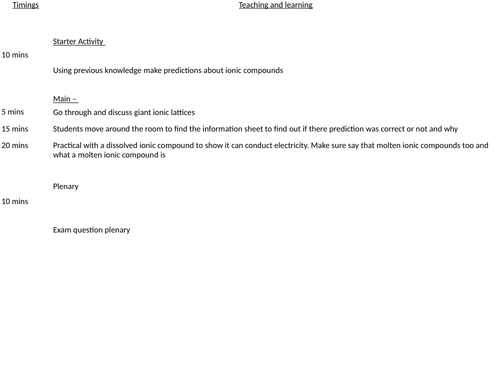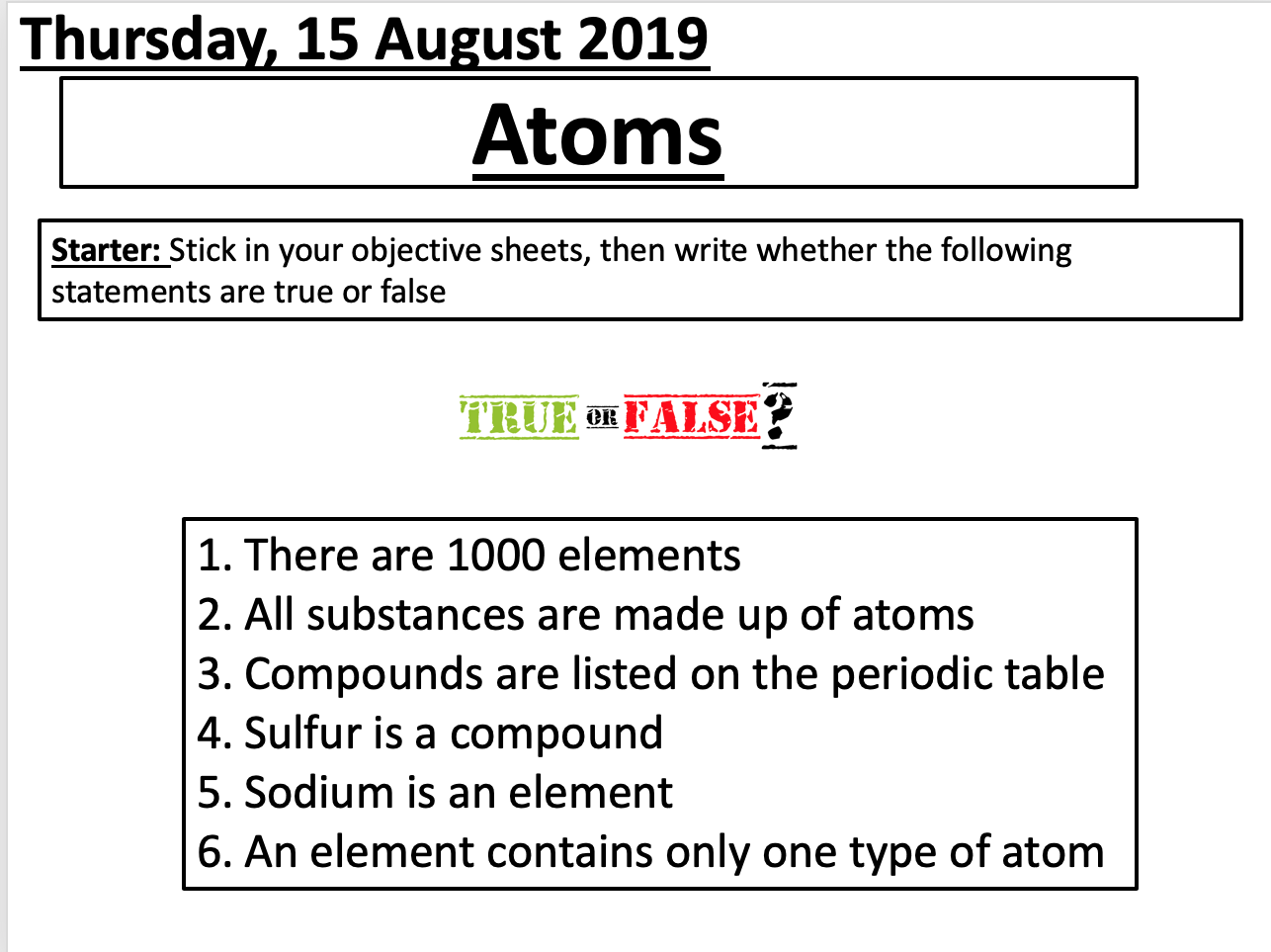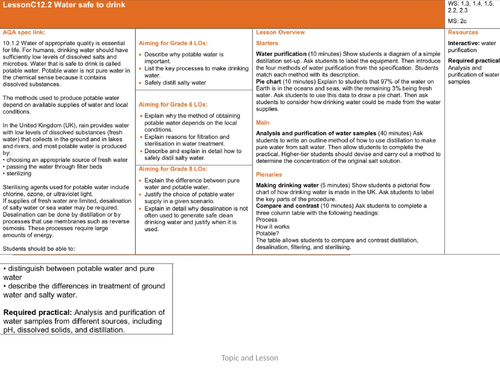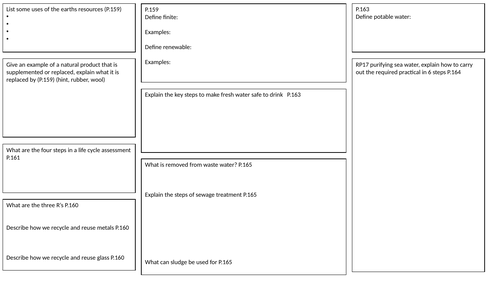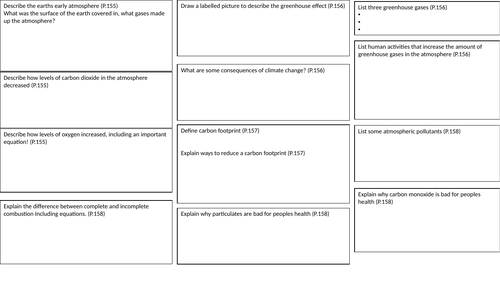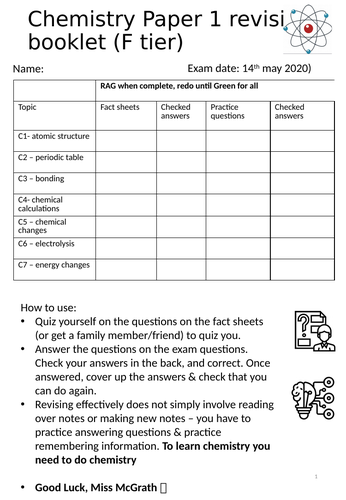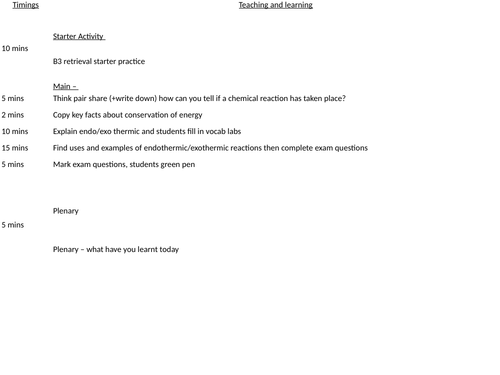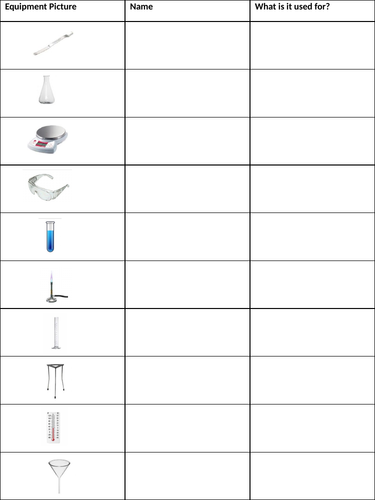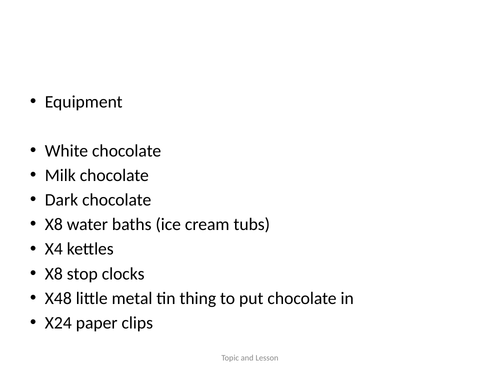
123Uploads
29k+Views
8k+Downloads
Chemistry

C3.4 Giant ionic structures - foundation
aimed at a lower ability class
Starter Activity
Using previous knowledge make predictions about ionic compounds
Main –
Go through and discuss giant ionic lattices
Students move around the room to find the information sheet to find out if there prediction was correct or not and why
Practical with a dissolved ionic compound to show it can conduct electricity. Make sure say that molten ionic compounds too and what a molten ionic compound is
Plenary
Exam question plenary

C12. treating waste water
For low ability students. targets level 4
Starter: differentiated stater based on prior learning of the topic
answers on following slide
Main: think pair share: where do we get waste water from
video: watch a video, try and pick out what the stages of treatment for waste water are
differentiated worksheets, to explain the process of waste water treatment
Extension: differentiated extension questions
Plenary: copy and complete two sentences

C12.5 Life cycle assessments
Aimed at low ability students, targets level 4
Starter: differentiated starter questions
Main: watch the video about a yogurt pot,thin about its journey
fill in grid showing the different stages of the LCA use textbooks to support
Class vote - which do they think is the most enviromentally damaging paper or plastic bags
Carry out LCA of paper and plastic bags using textbooks
evaluate which they think is most enviromentally damaging
Plenary: question to list the stages of the LCA

Chemistry paper one revision
Complete paper one Chemistry revision following the AQA trilogy specification.
Parts for higher only are highlighted.
work booklets to accompany powerpoint, which can be used in lessons or revision sessions.
Questions embedded in the powerpoint with answers for students to practice and focus on key concepts
My year 11s have found these benefical.

C1.2 Chemical equations
Aimed at a mixed ability year 9 class
Worksheets are from TES
Starter Activity
Answer starter questions
Main –
Go through state symbols, make a note of what each means
Explain the conservation of mass – need to write down the defintions
Stretch: why do some reactions appear to gain/lose mass
Go through steps on how to balance equations. Supporting worksheets to build up. Make sure there is an emphasis on what the ‘big’ and ‘little’ numbers mean. Do examples at each step, then get students to complete the rest
Extension sheet of harder equations to balance for students flying through
Plenary
Plenary – make rules for balancing equations

C1.4 fractional distillation and paper chromatography
aimed at a mixed ability year 9 class
Starter Activity
Match key words to definitions – go through answers
Main –
Students watch demo of fractional distillation. Explain uses/whats happening at each point. Students the write an explaination of how they can obtain pure ethanol
Set up chromatography experiment, whilst waiting for it to develop write a step by step method for the practical. Go over basics, this will be revisited as chromatography is a required practical.
Plenary
Tweet one thing they have learnt today

Pure and Impure
Suitable for KS3
Includes:
Recall starter
Pure and impure including particle diagrams
Pure and impure boiling points
practical investigation to investigate purity

C11.4 global climate change
Aimed at foundation students targets of level 4
Starter: differentiated bronze/silver/gold starter based on previous lessons in the topic, answers on following slide
Main:
Watch video, write a list of as many problems form global warming
think, pair, share: what is a a carbon footprint - write defintion
discuss what the different countries of the world are trying to do to combat global warming
Students fill in an information sheet from what they have learnt, differentiated extension questions with answers if students complete
Plenary: higher or lower, interactive, do you think the following country has a higher or lower level of renewable energy use

C11.1 History of our atmosphere
Aimed at foundation students. targets of level 4
Information about how the earths atmosphere was created, then a story board for students to fill in using questions from the version on the board.
Extension questions included to challenge students
extension sheet if students finish.
6 mark question on this topic for students to practice exam technique as a plenary

C12.1 Making water safe to drink
Starter: differentiated starter questions with answers
Main: Discussion which water from the pictures would you rather drink.
Define: potable water
Carry out required practical
answer questions
green pen, self assess questions
discuss why water is so important.
Complete worksheet to show how potable water is made (differentiated worksheets)

C12 revision sheet
C12 - the earths resources summary sheet
Aimed at students with targets of level 4’s
page numbers are from CGP foundation revision guide

C11 Summary sheet
aimed at students with targets of level 4
page numbers refer to pages in CGP foundation revision guide

Paper one chemistry revision
Complete paper one chemistry revision
Inspired by Dr Edmunds
Each section has a fact sheet to fill in, page numbers are highlighted from the foundation revision CGP booklet. Facts are based on the level 4 requirements from the kerboodle scheme of work.
The booklet contains the answers to the fact sheets
there are then practice questions with answers for each section

C7.1 exothermic and endothermic reactions
Aimed at foundation students - Does not include required practical
Starter - B3 retrieval starter practice
Main –
Think pair share (+write down) how can you tell if a chemical reaction has taken place?
Copy key facts about conservation of energy
Explain endo/exo thermic and students fill in vocab labs
Find uses and examples of endothermic/exothermic reactions then complete exam questions
Mark exam questions, students green pen
Plenary
Plenary – what have you learnt today

Elements
Appropriate for KS3
Recall starter, followed by an introduction to elements and particle diagram
Including a mini practical to get students thinking about key properties of elements

Lab equipment worksheet
A worksheet with common lab equipment for students to fill in as they are introduced to the lab.

Compounds
Suitable for KS3
Includes:
Introduction to compounds
Particle diagrams of elements and compounds
Naming compounds with two and three elements
Mini practical to compare elements and compounds
All answers included

Filtering and evaporation KS3
Aimed at mixed ability year 8 - Some resources from TES
L1 - Starter: thinking about what sea water contains
Main: Think pair, share how to separate sea water
introduce key words
write a method/risk assessment for practical
Plenary: particle diagram of what happens during filtering
L2 - Main label equiptment in the diagrams and mark
Main: complete rock salt practical
Differntiated bronze/gold worksheets for students to work their way through
Plenary: one thing students learnt today
Marking sticker provided for the practical, if you wish to level the students work

Melting points KS3
Aimed at mixed ability year 8 class
Starter: which chocolate do you think is the most pure?
Main: explain what is meant by pure
carry out a practical to melt different chocolates to work out which is most pure and how we know that
plenary: questions to evaluate the practical

